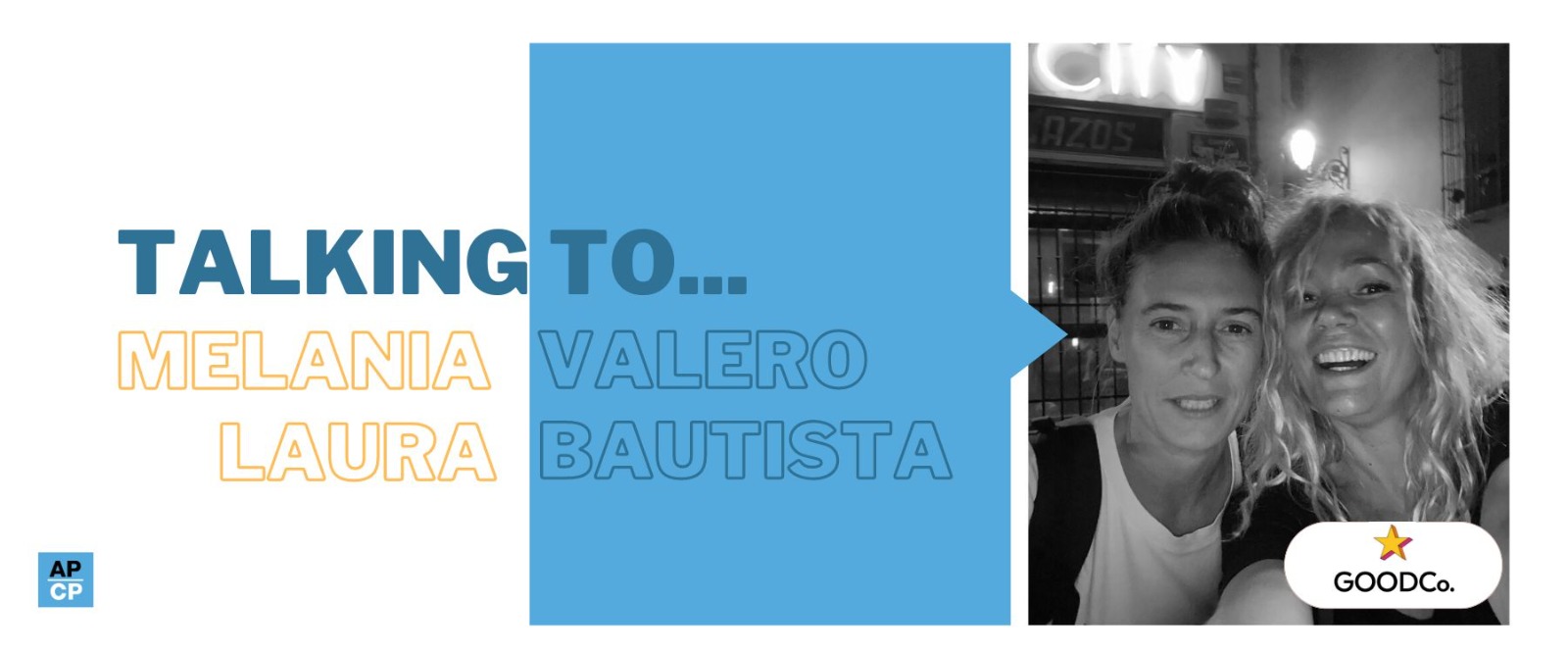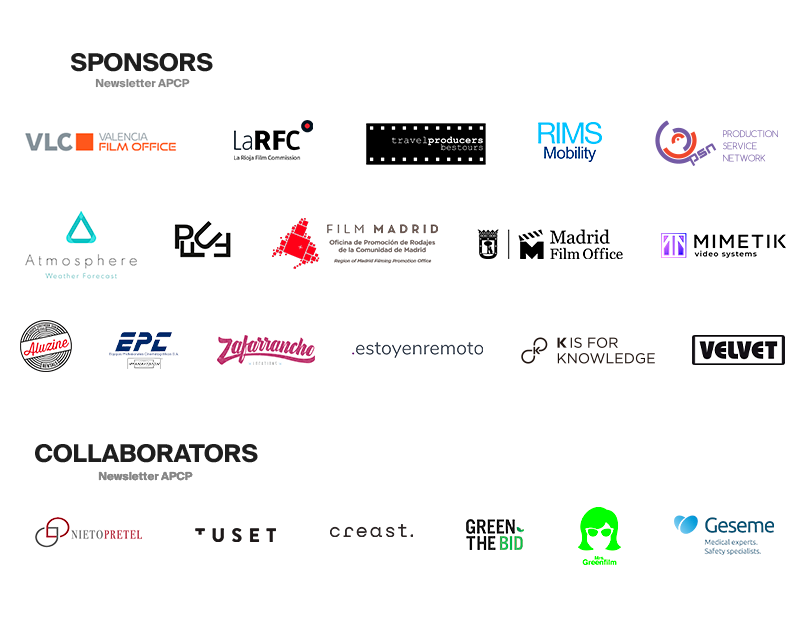
We continue with this dear and important section that focuses on acknowledging the value of our female professionals.
This week, we have interviewed Melania Valero and Laura Bautista, both executive producers of Good Company in Barcelona and Madrid.
This has been an interview characterised by the motivation and sincerity of their words. The same questions, but with answers from the points of view and experiences of two great professionals.
– Could you tell us about your professional career up until this day?
Melania: I studied advertising and PR without understanding very well what it was about, I just knew that you didn’t have to get up early and could dress in casual clothes. While studying, I met people from the audiovisual world who were working in Martian Chronicles (mythical programme of the late 90’s) at that time, and I liked the team spirit that may have been a little less present in advertising agencies. I guess my athlete genes might have had something to do with this way of thinking. For this reason, I decided to apply for an internship in an advertising production company and I was lucky enough to land in the one where Albert Saguer worked as director. Let’s say that he sensed my potential and did his best to give me the opportunity to do things that went beyond the typical archive tasks.
I continued my internship in Oviedo, where Andrea Parodi worked as Executive Producer together with Albert. There, I was also lucky enough to have a great professional like her around, giving me the opportunity to be her “junior”. During that time I learned almost every characteristic that, in my opinion, a good executive producer should have. Then I finished my degree, went to London for a year and joined Central de Producers for a little over two years after coming back. It was a very useful time for me, it helped me learn how production worked from the agency’s point of view and, specially, to get a lot of experience in reviewing budgets and shoots.
It was already 2015, seeing how the digitalization of the media was coming our way. Taking advantage of the entrepreneurial genes inherited from my parents, I decided to set up the first advertising production company 100% dedicated to online and social networks’ spots. For two years we had no competition and we shot super cool campaigns because at the time clients did not dare to spend the year’s budget on very risky things for TV, they prefered to invest on experimental and cheaper things for the Internet. In fact, some campaigns we did ended up replacing the TV campaigns. In 2017, many production companies were already producing the same type of products and I, who had always kept in touch with Albert, joined his Good Company structure, first as DivisionQ sharing the market with Picnic, Spotless and Wonka, and since a little more than a year ago under the global name of Good Company.
Laura: I was lucky enough to start working at McCann, one of the best agencies back in the day. Those were good times, with a lot of quality work and a lot of joy, in every sense of the word. When I was four years old, I saw very clearly that I was made to work on production and I was hired at Pirámide Madrid, in the post-production department, although what I was passionate about was production. After a few years at Lee and Spika I decided to set up my own production company, In a Place, with a director from Los Angeles. It was a beautiful project from which I learned a lot from. When my son was born, and in the midst of the 2009 crisis, I collaborated on projects with La Joya for a while, until I finally joined Good Company, at that time Picnic Madrid, where I stayed for 4 years. After a couple of years at Apartamento, I returned to Good Company, a production company where I continue to manage the executive production of the Madrid market.
– What is it like to work at Good Company?
Melania: It is exciting because there is a light structure and we work with professionals with very varied profiles, giving us the opportunity to get involved in projects that are different from traditional publishing, which of course we also do and love. But we always have that extra freedom to take the risk and see what happens.
I suppose that feeling can make some people dizzy, but for those of us who are born producers it keeps us stimulated and motivated despite the passing of the years. In addition, the working environment is very good and Albert, the boss, gives us a lot of freedom to manoeuvre. Also, our offices in Madrid and Barcelona have always collaborated as if they were a single production company, even more so since COVID / teleworking. This means that we are constantly in contact with directors, agencies and clients in both cities.
Laura: A very creative and different experience every day, together with my partner in crime, Melania. A continuous challenge. We give it a lot of thought, we don’t stop until we get the best possible and feasible production design depending on the characteristics of each project. We produce projects of all kinds and conditions, advertising, content, events, music video, etc., which makes us attentive to the continuous changes in trends and forms of audiovisual expression,there is no stopping.
– What projects have marked you the most in life?
Melania: I would say 3:
– McDonald’s “patitos” (ducklings) when I was an intern working with Albert Saguer and Andrea Parodi, because I realised the responsibility that comes with producing with someone else’s money.
– Seat Fingerboarding: because we shot it for digital platforms with my first production company for peanuts, to complement the Seat Skaters campaign that was on TV, and it received so many good comments on youtube that they ended up taking it off TV and broadcasting ours both in Spain and Portugal. I still talk about this project in College and it makes my hair stand on end.
– Terry White: already produced as DivisionQ, because the project was brutal but unfeasible economically, so we entered the second round of production companies and made a creative production proposal that not only made it viable, but also won us a lot of awards as well as the confidence of the industry to shoot bigger and more important projects.
Laura: I wouldn’t know how to list or define them, there has been a bit of everything! Each project is a new challenge, with each project you learn something new and face different things. Perhaps the ones that have marked me the most are the ones I’ve shot abroad or in different cities in Spain, because I love to travel. I’ve been lucky enough to participate in all kinds of productions, from big projects that have taken me to China, Los Angeles, etc., to others more focused on Europe, and most of them in Spain.
– Are there any new projects that you are filming at the moment or have in mind?
Melania: Being a volume production company we always have projects in production or in competition that are also very varied, so it is difficult to mention just one… What I would like to do in the medium term is to produce a feature film and ideally with Albert Saguer.
Laura: I‘m currently working on a project for an event that I’m really looking forward to, something different from the advertising campaigns I usually do. Learning and building new paths, and being very open to everything that may come along.
– How do you think our industry is evolving? What challenges are you facing now and what is your opinion about them?
Melania: More than our industry, I think everything is evolving (although sometimes I have my doubts about whether it is evolution or involution) towards rapid consumption … Whether it is clothing, music, hobbies, personal relationships and of course audiovisual consumption. So in my opinion, clients are going to need more content than ever but much more varied in format, impact and cost. That means that there will be core campaigns with the media and equipment that we are used to (and that have already decreased in number if we compare them to the ’80s) and also extensions of these campaigns and even new ones that will have to be produced in a lighter way and with a little more multitasking equipment. I understand that it is complicated having to adapt to this but, being sensible, it also seems impossible for clients to multiply their marketing budgets by a hundred every year in order to be able to produce all those pieces that the viewer demands, as we would like to from advertising production companies. In fact, for me the most contradictory thing about the current times is having to produce in a lighter way at the same time that things are getting more and more difficult at a legal and contractual level in the processes.
Laura: The arrival of digital and social media in our lives has changed everything. We produce campaigns adapting them to all formats, TV, digital, social networks, graphics… The budget for volume productions is getting smaller and smaller and most of the projects are a real challenge. My opinion? Adapt or perish.
– What would you say it takes to work in this industry?
Melania: To accept that this is a way of life, that tempos and variations on what you are told at the beginning of a project and what you end up doing are part of normality. Nobody wants to bother anyone here, but this is an industry that feeds on current events, and an idea that was great a month ago could be out of place today if something that has nothing to do either with the clients or with us happened in the world along the way.
I suppose that way of always living surfing whatever comes along can cause adrenaline addiction or anguish due to the feeling of lack of control of the situation, depending on the person. Let’s remember that a production is a perfect gear of more than 30 professionals, each playing a vital role in the final result. At busy times you may not even get to know some of these figures. Not to mention that even if your gear works perfectly, there are things that are always susceptible to spoiling an impeccable shoot, such as bad weather, a camera that breaks down or an actor who has had an accident and doesn’t make it. So either you learn to trust that no matter what happens everything will be fine, or in less than two years you’re so burned out that you change industries.
Laura: A lot of passion, hard work and perseverance, talent and spirit, balance and lots and lots of desire.
– What would you say to the young people who want to be part of the audiovisual world?
Melania: Professionally, it is the most exciting world I know. Unstable, demanding and inbred too, but if you like the action and feeling that every day will be different, and if you like to sit with your team in front of a story and think “how the hell are we going to do this well with the money we have”, I do not think there can be a better and more rewarding job.
Laura: I always said that this profession, more than a job, is a life option. I would tell them that if it calls out to them they should work hard and never give up. Be constant, because with hard work and desire you can get anywhere.



